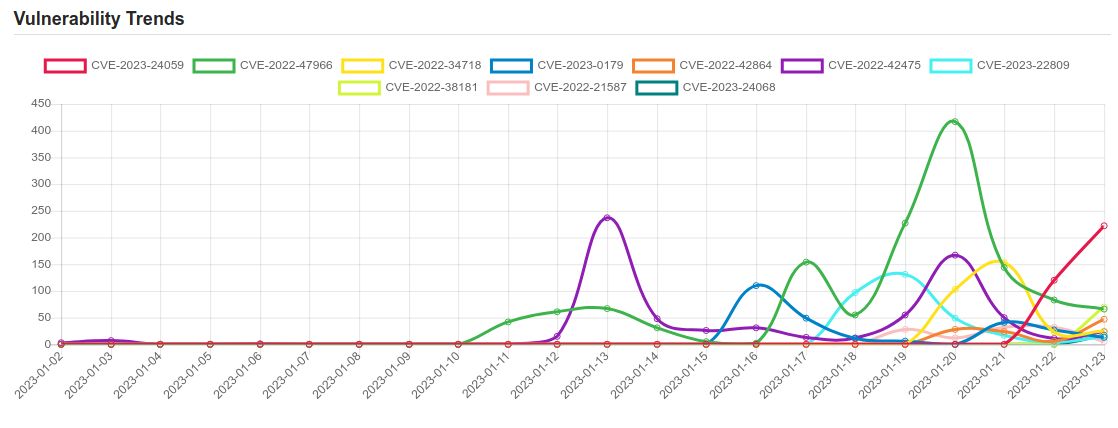Daily Vulnerability Trends: Tue Jan 24 2023

| CVE NAME | CVE Description |
| CVE-2023-24068 | Signal Desktop before 6.2.0 on Windows, Linux, and macOS allows an attacker to modify conversation attachments within the attachments.noindex directory. Client mechanisms fail to validate modifications of existing cached files, resulting in an attacker’s ability to insert malicious code into pre-existing attachments or replace them completely. A threat actor can forward the existing attachment in the corresponding conversation to external groups, and the name and size of the file will not change, allowing the malware to masquerade as another file. |
| CVE-2020-28362 | Go before 1.14.12 and 1.15.x before 1.15.4 allows Denial of Service. |
| CVE-2022-44877 | login/index.php in CWP (aka Control Web Panel or CentOS Web Panel) 7 before 0.9.8.1147 allows remote attackers to execute arbitrary OS commands via shell metacharacters in the login parameter. |
| CVE-2022-2602 | No description provided |
| CVE-2023-24069 | Signal Desktop before 6.2.0 on Windows, Linux, and macOS allows an attacker to obtain potentially sensitive attachments sent in messages from the attachments.noindex directory. Cached attachments are not effectively cleared. In some cases, even after a self-initiated file deletion, an attacker can still recover the file if it was previously replied to in a conversation. (Local filesystem access is needed by the attacker.) |
| CVE-2007-4559 | Directory traversal vulnerability in the (1) extract and (2) extractall functions in the tarfile module in Python allows user-assisted remote attackers to overwrite arbitrary files via a .. (dot dot) sequence in filenames in a TAR archive, a related issue to CVE-2001-1267. |
| CVE-2023-21434 | No description provided |
| CVE-2022-42856 | A type confusion issue was addressed with improved state handling. This issue is fixed in Safari 16.2, tvOS 16.2, macOS Ventura 13.1, iOS 15.7.2 and iPadOS 15.7.2, iOS 16.1.2. Processing maliciously crafted web content may lead to arbitrary code execution. Apple is aware of a report that this issue may have been actively exploited against versions of iOS released before iOS 15.1.. |
| CVE-2023-21433 | No description provided |
| CVE-2023-24055 | ** DISPUTED ** KeePass through 2.53 (in a default installation) allows an attacker, who has write access to the XML configuration file, to obtain the cleartext passwords by adding an export trigger. NOTE: the vendor’s position is that the password database is not intended to be secure against an attacker who has that level of access to the local PC. |
| CVE-2022-46689 | A race condition was addressed with additional validation. This issue is fixed in tvOS 16.2, macOS Monterey 12.6.2, macOS Ventura 13.1, macOS Big Sur 11.7.2, iOS 15.7.2 and iPadOS 15.7.2, iOS 16.2 and iPadOS 16.2, watchOS 9.2. An app may be able to execute arbitrary code with kernel privileges. |
| CVE-2023-24059 | Grand Theft Auto V for PC allows attackers to achieve partial remote code execution or modify files on a PC, as exploited in the wild in January 2023. |
| CVE-2022-47966 | Multiple Zoho ManageEngine on-premise products, such as ServiceDesk Plus through 14003, allow remote code execution due to use of Apache xmlsec (aka XML Security for Java) 1.4.1, because the xmlsec XSLT features, by design in that version, make the application responsible for certain security protections, and the ManageEngine applications did not provide those protections. |
| CVE-2022-34718 | Windows TCP/IP Remote Code Execution Vulnerability. |
| CVE-2023-0179 | No description provided |
A considerable amount of time and effort goes into maintaining this website, creating backend automation and creating new features and content for you to make actionable intelligence decisions. Everyone that supports the site helps enable new functionality.
If you like the site, please support us on Patreon using the button below

To keep up to date follow us on the below channels.





![Cobalt Strike Beacon Detected - 115[.]120[.]232[.]177:4444 7 Cobalt-Strike](https://www.redpacketsecurity.com/wp-content/uploads/2021/11/Cobalt-Strike-300x201.jpg)
